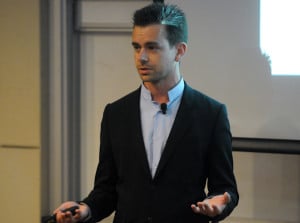Listen to The Daily’s interview with Jack Dorsey here
Simplicity, communication and elegance were the principal themes articulated by Jack Dorsey — CEO of Square, a mobile payments company, and one of the original founders of Twitter — in a presentation to an overflowing audience in the Packard Electrical Engineering Building Wednesday evening.
The presentation featured Dorsey, Square Chief Operating Officer Keith Rabois ‘91 and Square Vice President of Hardware Jesse Dorogusker ‘93 M.S. ‘97 engaging in an open discussion of the nature of the mobile payment business, the development of Square and their future plans.
Dorsey began the event with a brief discussion of the payments not as transactions, but “as communication, a simple interaction that is an expression of value from party to party.”

He described the company’s origin as an attempt to address a simple problem demonstrated by the need of a friend to accept credit card payments for pieces of art that he was selling.
“He very simply wanted to make a payment but didn’t have access to those payment rails, which meant that he lost out on important revenue,” Dorsey explained.
Discussing the current state of electronic payment processing, Dorsey emphasized, “those systems are not beautiful, not easy, not mobile. The user experience is designed to maximize utility and nothing else.”
Honing the process over the last three years, the Square team found its main audience in “sole proprietors and brick-and-mortar small businesses”.
“There are 26 million businesses in America today that do not accept credit cards,” Dorsey said, describing those firms as prime consumers of Square’s services.
Critiquing large credit card companies “for the hidden costs of payments that no one is telling businesses about,” Dorsey presented Square’s flat rate of 2.75 percent as an alternative to the “mess that is credit payments”. Furthermore, relating the technological capabilities currently available to Square’s payments model, he discussed the potential use of Square products.
Dorsey explained that Square can create tabs to develop relationships between producer and consumer, use geolocation technologies to alert consumers of businesses near them, make the payments process less laborious and allow small businesses access to analytic tools.
“It’s 97 degrees out, and there are a bunch of people down the street who want lemonade, and you, as a business, don’t sell that,” Dorsey hypothesized. “Square will help you say, why don’t you change that?”
“The big retailers, like Starbucks and Walmart, already have these tools at their disposal,” Dorsey added. “Why can’t smaller businesses utilize them as well?”
Dorsey ultimately expressed his ambition for the company to serve as one that “can make every transaction meaningful to both the consumer and the vendor.” He then opened his presentation to his two colleagues for a question-and-answer round, in which audience questions ranged from security and user interaction to possible competitors for Square’s products.
On the issue of security, Rabois discussed using the trove of information available to Square, such as the time and place of transactions, to raise certain internal flags and prompt investigations of suspicious behavior.
In response to concerns expressed by an audience member about the viability of a payment method vastly different from conventional point-of-sales transaction, Dorsey emphasized the incremental nature of Square’s evolution and application.
“We are not trying to create new behavior, but borrow from what people have already learnt and make it simpler and more efficient,” Dorsey clarified.
The talk was well received by those who attended and participated in an informal discussion session with the three speakers after the event.
Ike Shehadeh, proprietor of the popular campus eatery Ike’s Place, told The Daily, “I thought the event was very informative to hear about the company. I use them in some of my stores, and to know what’s happening behind the scenes makes me want to do business with them more.”
“As far as it goes right now, at the business at the volume that mine is, it might not be feasible given what I need, and where they are,” Shehadeh added. “I know they can get there, and hopefully they can get to that stage where we can start working with them.”